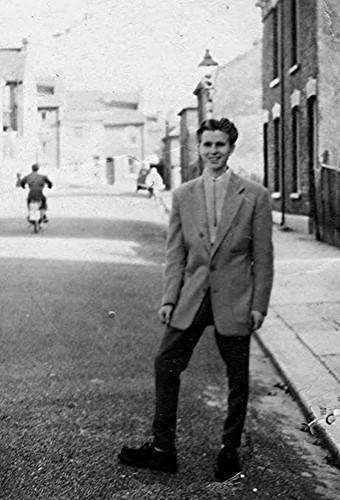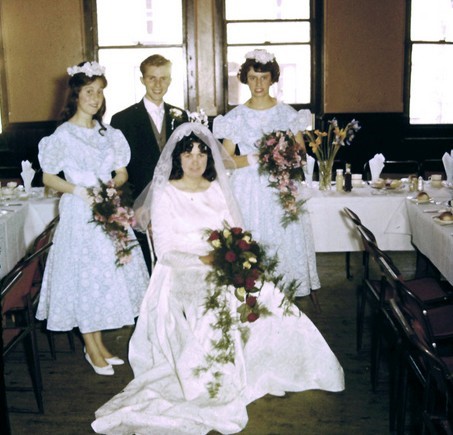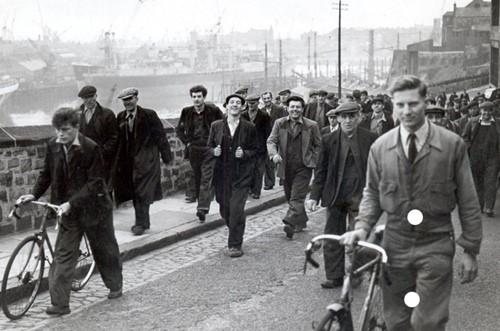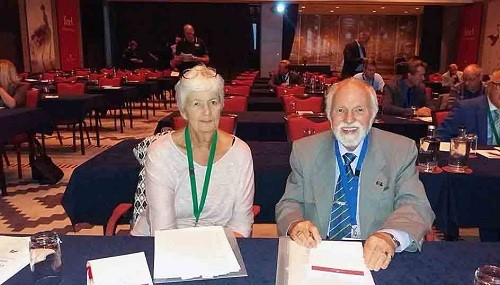Raymond Nye worked as a shipwright apprentice in 1957. He recalls the shocking working conditions that would lead to his wife contracting mesothelioma off the dust on his overalls.
Features
A day in the life
This is a different take on mesothelioma. You may have already read from carers about how they deal with this disease.
I thought I would give my side and show how easy it was – and still is easy – to fall prey to asbestos exposure. I use a typical day when I was a teenager back in the distant days in the mid-1950s, a day in the life of a shipwright apprentice at Chatham Naval Dockyard.
 Ray Nye as a young man in the 1950s when he worked as a shipwright apprentice
Ray Nye as a young man in the 1950s when he worked as a shipwright apprenticeHere is what a major ship refit would look like. It does not fall into the realms most of you would imagine from films of posh cruise ships, of clean naval ships all spick and span. It does, however, resemble the inside of a dustbin. There are no fixtures or fittings; no lights, only low wattage emergency lamps strung up all over the place.
No decks or upper decks and very few cabins. Just one great big, empty, rusty, dirty metal container from end to end and top to bottom like the inside of a giant cigar. Hundreds of men of all trades are buzzing about doing their thing.
A typical day for me as a fourth-year apprentice at 19 years’ old in 1957 would run along these lines.
My dad would shake me around 6am. I would struggle to get out of bed in the cold. In those days we had no central heating and I would boil a kettle for a wash in the sink while he made a pot of tea. His way of making tea was to put two or three heaped handfuls of tea in the pot (no teabags). It was so strong and black.
Toast was done under the grill – most times it would be burnt on one side.
Trying to spread butter that was frozen and solid, even without a fridge, was not easy.
 Mavis and Ray on their wedding day. Mavis contracted mesothelioma decades later, because she washed her husband's overalls which were full of asbestos dust.
Mavis and Ray on their wedding day. Mavis contracted mesothelioma decades later, because she washed her husband's overalls which were full of asbestos dust.After a bite of burnt toast and a sip of dad’s black tea, next it was get dressed and go into the back yard to carry my bike round the narrow back alley. Setting off down the hill into the high street pedalling hard at 6.30am when half-awake was not good!
But arriving at my clocking station some four miles away at about a minute to 7am was not unusual for me. I made my way on board the ship to start the day. This meant walking along the dockside, stepping over all manner of parts covered in asbestos, such as pipes, engine bits and asbestos piled on barrows ready for disposal somewhere.
Then I boarded the ship via the gangway, stepping through a snake bed of miles of hissing, spitting, leaking, noisy compressed air pipes strewn along the decks, churning the asbestos into a dust cloud. I kicked aside rubbish strewn about everywhere. Unfortunately, a lot of this rubbish was asbestos, which had been stripped and dumped where it fell ready for clearing some time later.
 Shipyard workers pictured during the 1950s in Sunderland. Photograph: James Cronin / Pinterest
Shipyard workers pictured during the 1950s in Sunderland. Photograph: James Cronin / PinterestEventually, I’d arrive at my work-station. By now the 7am start hooter had sounded and all the trades would be starting up for the day. I would hang my coat up on any projection that was handy and step into my overalls which had been hanging in the asbestos dust-laden air all night and start work myself.
The noise from a multitude of iron caulkers demolishing decks and bulkheads was horrendous. To communicate with fellow workers was mostly sign language or shouting in their ear or, if you had any chalk, by writing on the deck or bulkhead.
The constant need to shield your eyes from nearby welder’s flash was always present. The last thing you wanted was a flash because for days it was agony.
On this particular day I’m remembering, my job was to make and fit a series of bunks in a petty officers’ mess. So, armed with my rolled-up drawings I hunt for the right frame number and location.
Now I can make a start. This entailed measuring up for a framework to support the bunks. I went ashore to sort materials, liaising with the acetylene burner to cut my material and arranging for the pieces to be slung aboard, when I could find a slinger. He was the man responsible for directing the crane driver when slinging items aboard.
When this was done and my material was onboard. I would go up to top deck and find it and carry it back to my job and commence assembling it. This would entail putting it in place and spot welding it ready for the welders to complete.
Whilst all this normal activity was going on, there would be several gangs of caulkers busy chipping away at the overhead deck and bulkheads all around you, removing pipes and all manner of things and spilling asbestos freely everywhere. This asbestos lays on the decks until a cleaner comes along and sweeps it up into piles. These same piles are like the ones you walk through when you come aboard and walk through every day to reach the area that you have to work in.
The caulkers chipping away this asbestos from overhead pipe work creates a dust that is unavoidable. It settles on the decks, and on your clothes; also on those you left hanging up at the start of the day, it settles into your hair and on your overalls and skin as you work in its vicinity.
Basically, it’s a cloud of dust throughout the ship.
All this dust is constantly on the move fanned by the miles and miles of leaky compressed air lines fanning it. Once on board, avoiding asbestos dust is impossible. We had no face masks or ear defenders. I don’t think HSE was invented yet.
When it’s time for a break, the hooter blows and we stop work, make our tea and get out a sandwich. The act of eating a sandwich in this environment is impossible to avoid the dust cloud settling on your cheese and tomato. It also settles on the top of your tea. There is no escape from it. So, you eat it and drink it in.
The trouble is, it is ‘just dust’ and most days you are not aware of it because it is there every day, all day. You don’t even notice it. OK, you may end up coughing when it’s particularly heavy but well, it’s only dust isn’t it? If it was dangerous, surely we would have been told.
Just ignore it because the hooter sounds again, break is over and back into it again, not that you ever left it because the airlines don’t switch off at break times so the cloud is always being blown about.
The hooter sounds for the end of a nine-hour shift. Now we can slip out of our overalls and slip on our coats again, which by now have been hanging in the asbestos dust laden air all day, ready to take it home with us. So that unwittingly I expose the rest of the family to the hazards of asbestos.
At the end of the day, at no time does your chargehand or any responsible person advise you to take care and warn you of the dangers of working in proximity of asbestos. No one in authority does.
And so, this lays down the legacy for our future and our family 40 years down the line.
This is why my wife Mavis, who only washed my clothes as a newlywed bride, now has mesothelioma.
 Mavis and Ray have set up a Foundation to offer support to mesothelioma victims and fund research into treatment
Mavis and Ray have set up a Foundation to offer support to mesothelioma victims and fund research into treatmentTo donate to the Mavis Nye Foundation, visit the website here
Mavis blogs about her life and her campaigning work: rayandmave.wordpress.com
FEATURES

How to build circular economy business models
By Chloe Miller, CC Consulting on 07 April 2025
Widespread adoption of a circular economy model by business would ensure greater environmental and economic value is extracted and retained from raw materials and products, while simultaneously reducing carbon emissions, protecting the environment and boosting business efficiency and reputation.

What does the first year on an accelerated net zero path have in store for UK businesses?
By Team Energy on 07 April 2025
The UK is halfway to net zero by 2050 and on a new, sped-up net zero pathway. In light of this, Graham Paul, sales, marketing & client services director at TEAM Energy, speaks to TEAM Energy’s efficiency and carbon reduction experts about the future of energy efficiency and net zero in the UK.

Aligning organisational culture with sustainability: a win, win for the environment and business
By Dr Keith Whitehead, British Safety Council on 04 April 2025
The culture of an organisation is crucial in determining how successfully it implements, integrates and achieves its sustainability and environmental goals and practices. However, there are a number of simple ways of ensuring a positive organisational culture where everyone is fully committed to achieving excellent sustainability performance.



